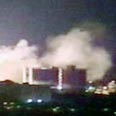


IDF Chief of Staff Lieutenant General Dan Halutz announced on Monday that the two Navy officers at the rank of colonel would be reprimanded following the incident, and that the ship's commander, a lieutenant colonel, would also be punished by the Navy commander, and his next position would be at the headquarters and not a commanding position.
Similar proceedings were also decided for two junior officers.
During the investigation responsibility for the very serious malfunctioning was placed on one of these junior officers, who has completed his role on the ship and is currently serving in a headquarters' position.
The junior officer who was punished had decided to shut down part of the defense system about one hour before the incident occurred, without notifying the commander. He also shut down the central radar which is mean to identify missiles and aircraft, without notifying his superiors.
The Navy made it clear that he was not acting out of malice, but that he truly believed that the ship was not in any sort of danger. The Navy also stated that the hard outcome of the event would have occurred even if the junior officer had not taken these actions.
'Bad message to IDF commanders'
Nonetheless, the naval commander admitted that this was a wrong move made by the officer, who did not report his actions to his superiors.
for the incident lies first and foremost on the Navy's operational intelligence headquarters, which is headed by the Navy commander himself.
Still, Halutz has decided not to take action against any of the Navy's senior officials.
A sigh of relief was felt at the Navy following Halutz's decision, but senior sources in the Israel Defense Force told Ynet that Halutz belittled that incident.
"There is no way that such a serious incident can end with such a weak response," said a senior officer, "the Navy commander himself came out clean and all his senior officers, one of which will be the Navy commander a year from now, got out without a scratch. These light steps convey a bad message to IDF commanders."
The strike to the ship, that lead to the death of four soldiers and a hard hit to the Navy's image is one of the most difficult events to take place during the second Lebanon war.
Navy Commander Major-General David Ben Ba’ashat explained that the threat of Iranian C802 missiles to the ship seemed "unrealistic and imaginary," and the missile boat's crew acted under the assumption that there was no way such a missile would be in Hizbullah's hands.
Four IDF soldiers were killed in the incident: Staff Sergeant Tal Emger, 21 from Ashdod, Staff Sergeant Yaniv Herschkowitz, 21 from Haifa, Sergeant Shai Atias, 19 from Rishon Lezion, and 1st Sgt. Dov Sternshus, 27 from Carmiel.
Orna Emger, mother of one of the dead soldiers, Tal Emger, expressed satisfaction with the results of the investigation, despite the fact that Halutz was very easy on the officers of the ship. "I am glad they investigated and have come to conclusions" she said Monday evening.
She added that "the Navy and IDF acted clearly and did not hide any information. We also knew what was going on there."
Regarding Halutz's decision to give those responsible a mere slap on the wrist, Orna explained that "we are not getting into this, they have made their decision and that is the end of it. The fact that the investigation took place is enough for us. We feel it should have occurred a long time ago, but the IDF chief had his own reservations."
The bereaved mother also expressed hope for the future, that from now on "they will not be smug." She said this regarding the Navy commander's previous statement that the Iranian missile threat was "unrealistic and imaginary."
'You wanted an all-out war'
The incident occurred on July 14, 2006 during the fighting in Lebanon; the ship was struck by an Iranian missile launched from the Lebanese shore by Hizbullah. The vessel was hit near its landing pad, located in the aft part of the vessel.
The hit caused damage to the internal systems. After the missile boat commanders finished extinguishing the fire, they took a crew count.
After a few rounds of counting it became apparent that four of the staff members were still missing. Large forces were called to the area, and under heavy fire, searches continued off the coast.
Tal Emger's body was found a few hours later, and the bodies of the other three soldiers were only found three days later. No one was wounded by the fire.
A short while later the staff continued to inspect the vessel and it was clear that the hit was wider then expected, and even affected the ship's internal systems.
The first one to announce the attack was Hizbullah Chief Hassan Nasrallah . "You wanted an all-out war – and that is what you will get. You have no idea who you are dealing with," he said a short while after his headquarters in Beirut were bombed by the Israeli Air Force and Navy.
Meanwhile it was reported that the IDF has decided to take action against two senior Navy officers suspected of leaking information on the incident to the media on the day of the attack.
Following an investigation into the matter Military Advocate General, Brigadier General Avihai Mandelblit decided that the higher-ranking officer, a bbrigadier general, will be tried by Deputy IDF Chief of Staff Maj.-Gen. Moshe Kaplinsky.
Mandelblit said it cannot be proven that the officer disclosed confidential information to a reporter and will therefore be put on disciplinary trial for ‘not following orders’.
Kaplinsky found the officer guilty, but decided to make due with a warning. The matter is expected to be brought before Halutz as well, which may affect the officer’s future in the army.
It was decided that the second officer, a lieutenant colonel, would be suspended for 30 days, during which time a hearing will be held to determine his future in the military.















